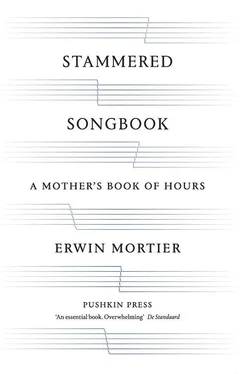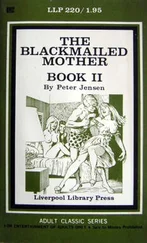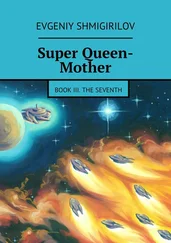I regularly think: let her die, let her go in her sleep, which is almost never a peaceful sleep any more, but irritable slumber, as if sleep eludes her even in her sleep — like everything else. A year ago she sat on her chair all day long when the radio broadcast Bach, as if the divine order of his music disentangled the knots in her head.
She sat there the whole day, and even held her palm against the speaker. She motioned us to be quiet as she didn’t want to miss anything.
How jealous of Bach I was.
Sometimes I dream that you’re dead, that I’m standing by your body in which the devastation has taken place, and I don’t know if I’m relieved or sad. I just feel a searing pain in my chest, and I think: this is the price of my birthright, the settling of accounts for what was agreed when I fell from your pelvis forty-four years ago, without you or me being involved.

At the party in the garden, among all those people, in the shade and in the sun, you walked back and forth between the tables on the grass, abandoned, uncomprehending. If the hectic behaviour of the playing children and screaming on the trampoline became too much for you, you went into the house, where you stared out of the window. You used to be the life and soul of the party, now you’re a ghost wandering through the house. In the afternoon you slept in the deckchair, in the shade of the silver birch, while we ate at a table next to you. We all looked over our shoulder now and then at your sleep, which was peaceful.
Sometimes Veerle asked: is she still breathing? And An said: it would be a nice death, slipping away with all those children round her.

I have resolved only to start crying when she is actually completely dead — that is, cold and no longer breathing. There is a bucket of amorphous pain inside me, into which I regularly tip all sorts of things before closing the lid again, and what eventually comes out of it and how, liquid or in splodges, we shall see. Give me the benefit of your understanding when it comes to the point. Today, I sat writing in the garden, which was exploding around me in growth — and me in the middle of it all, something like delicately blown glass on which the sun was breaking its milk teeth. The clouds were doing their best to look like Spanish armies, from the time of the Duke of Alva, with lances and halberds. The large specimens formed into citadels with steaming battlements to be captured — but there was one that couldn’t be bothered and preferred to act in turn as a wheelbarrow, a tea cosy and a tricycle.
I had to persuade Dad that it has gradually become necessary to provide permanent residential care for my mother. He is aware of that, but finds it difficult to take in. He considers it betrayal, he feels guilty. So it was a cautious conversation. I with all my antennae alert steering a course round many cliffs so as not to offend him. He nodding, saying nothing, sobbing. But the conclusion was that shortly I shall be going to the nursing home with one of my sisters and putting Mum on the waiting list. So in a few months, given her condition, she will be leaving the house for good.
After the first shock he realizes that it is not the best but the least bad solution, and so do I. Nevertheless I am racked with guilt. I am pushing my mother out of the house, because there’s no alternative. My father is crying with misery. Oh, I say nothing, I look out of the window at how beautifully blue the evening is. The white poplar waves a thousand grey-green crib sheets at once.
There has been so much death in the last few years. Every few months or so standing at the deathbed of someone close numbs the heart. I should get the ash washed out of my pores. I should like once again to be the creature with the thousand vibrating cilia that shimmers with a rapture approaching despair at each leaf that falls from a branch, each fall of light or the ecstatic proximity of a still-unknown body with the bronze boom of all the intertwined histories, all the fears and longings it harbours, and which I want to read like braille, until the ink splashes onto the page out of sheer abundance. Without it writing is harder.
Stupidity, selfishness and health, that’s what you need to be happy. But if the first is lacking, all is lost (Flaubert).

Day in, day out she walks round the house. She doesn’t sit still for more than ten minutes at a time. She opens drawers she has left untouched for months or years, and looks and looks. I find her in the kitchen trying to spoon gravy from a pan, while holding a glass under the tap. It is as if her body is making a last effort to keep a grip on things.
She strolls through my study, for half an hour she walks from the living room to the hall to the dining room with my dictionary in her hands. Then she puts it on the window sill, trying to place it exactly parallel with the edge, and leaves it there.

I had imagined their old age differently. In twenty years or so they would be old, the roles would be reversed and it’d be us who looked after them. But their old age is suddenly on the doorstep, and won’t go away. I smell it in their clothes, they no longer bother to change their underwear every day, I fear — a helper will have to come in. How would he be able to cope otherwise? She traipses round after him all day long. Even on the toilet he is scarcely alone. She clings to him. Everywhere and at every moment that one word she has left, Dad, rings out — ever more hoarsely.
Is this life then? I wonder aloud at breakfast. Yes, this is life, says Lieven. And we haven’t seen the end of it yet.

In the intervals between writing — I work from the morning until about four in the afternoon — I am gradually preparing for another farewell: from my grandmother, my mother’s mother. Her shoulder is not healing, after that fall she had a few months back. Increasingly she develops a high temperature, has problems with all kinds of infections and, mainly, mentally she has virtually “gone”. She seems to have no sense of place or time, and when I last saw her she called me “Jozef”, the name of her brother who was killed in the war. She said nothing else, apart from the the mumbled rosaries she prays every waking hour. It would surprise me if she makes it to Easter.
If she dies, I shall have to support my father for a few days, as my mother won’t be much help to him. She herself, to my relief, reacts calmly to developments. It will be a release, she said to me — strikingly lucidly and without faltering.

She died on Thursday morning at about ten o’clock, the grandmother. While I was on the train home the Monday before, I had a call from my father, who told me that she was failing fast. My sisters, my brothers and I stood watch by her bedside. I’m glad she remembered me, although she was too weak to talk — she spoke with her eyes and squeezed my hand.
Читать дальше













